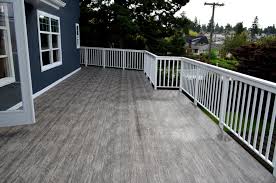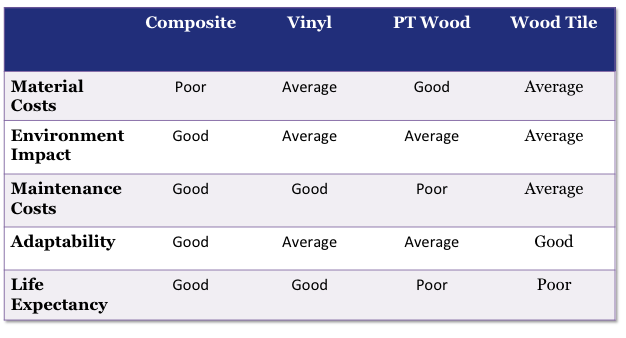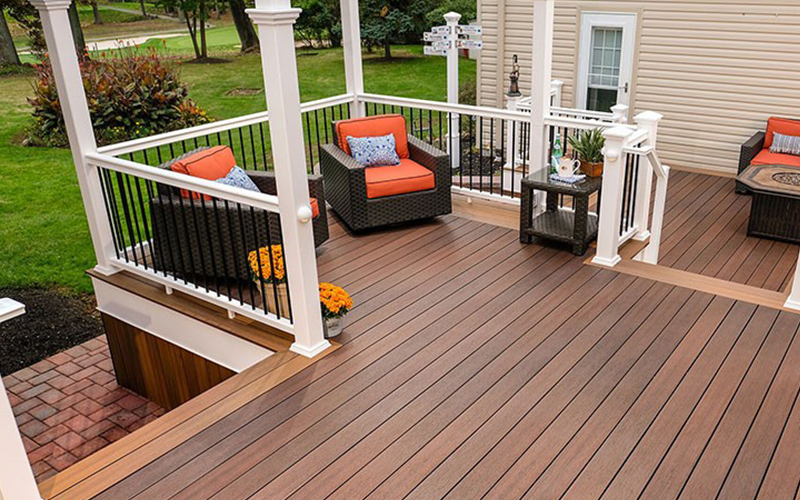For those who are thinking about installing or upgrading their decks, it is critical to be aware of the many factors that can either improve or hamper your home decor and real estate value. Jay Fencing can help you plan and install the right deck for your home or commercial property.
Both vinyl and composite decks are more expensive than wood decks but are worth the extra cost given less maintenance, higher durability and longer life expectancy. For those that are more cost and environmental conscious composite decks are the better choice. While owners who are less concerned about cost and environmental impact and instead desiring the best in longevity and ease of maintenance vinyl decks are the best choice. This article will help you further understand what are the relative differences between each type of deck, their benefits, and also cost considerations.
What are Composite and Vinyl Decks?
There are numerous options in terms of material for a deck project. The following two options are particularly important to understand as we highlight composite and vinyl decks.
Composite decks – are fabricated from wood and recycled plastic during manufacturing of the deck boards.
Vinyl decks – are produced exclusively from plastic, this is also typically referred to as virgin vinyl.
Wood (Pressure Treated) – Pressure treated wood is placed through a process that infuses chemical preservatives into the wood, improving its resilience to damage from insects and decay.
Tile Decks – Tiled squares made of wood laid out and arranged without glue or other types of adhesive.

Comparison of Types of Decks
The following factors are key considerations for a deck project, not only in terms of immediate costs but also with consideration to long-term maintenance, life expectancy, and the environment. The analysis also provides a view into how the materials can be adapted to suit your property.
Material Cost – The upfront costs of purchasing the material.
Environmental Impact – Gauges the extent of use of recycled products.
Maintenance Cost – Costs associated with ensuring a functional look and feel.
Adaptability – How flexible is the material to your home layout or aesthetics.
Life Expectancy – On average the quality of life expectancy of the material.
The following chart gauges the key qualities when choosing a deck material, based on findings from a business in Pennsylvania. It provides insights to begin understanding the considerations to be made in finding a deck that is the right fit.

Benefits of Decking Materials
Knowing the benefits of the different types of decking materials is helpful in considering the costs of a decking project. Having worked with a number of materials, customers often get the greatest value from composite and vinyl materials. To help customers think through which material would be best, cost estimates from Popular Mechanics have also been provided as an illustration; contact Jay Fencing for up to date pricing on deck materials.
Composite Decks
Composite wood decking is appreciated for its light footprint on the environment and practical maintenance qualities. Here are some benefits and data points on costs associated with the compose wood option.
Benefits
- Less maintenance than pure wood decks and can be cleaned with typical household items
- Durable and can withstand rotting/weathering due to its composition materials compared to PT Wood
- Environmentally friendly as it is often created with recyclable materials
Costs – Composite on average is more economical than wood
Popular Mechanic notes: Prices vary because there are so many [manufacturers], but composites are typically less expensive than plastic lumber. For example, for 5/4 x 6-in. decking, expect to pay about $2.50 per linear foot for composites, and $3 per linear foot for plastic lumber. Composite decks also run comparatively with Vinyl decks.
Vinyl Decks
Vinyl decking offers a lower maintenance cost and life expectancy supported as it is resistant to degradation factors like bug attacks, splinters, and cracks.
Benefits
- Resistant to fading and splinters compared to PT Wood decks
- Quality of materials resists common erosion elements
- Long life expectancy
- Low maintenance
Costs -lower up-front costs than wood
doityouself.com notes that pure (virgin) vinyl decking that doesn’t contain wood pulp is the only type of composite decking that may save you money in the long run. Though due to the specialized solutions required to clean vinyl, there are additional maintenance costs and could be 75% more costly than wood.
Jay Fencing Choice Service Provider for Decks
Here is what some of our recent satisfied customers have said when they got in touch with Jay Fencing:
Decks can improve the look and function of every yard and every home. Jay Fencing provides high-quality decks in a variety of styles and materials, so you can enjoy the benefits of a customized deck experience. Call us today and one of our professionals will come to your home to discuss cost, placement and your personal preferences for our decks in Waterloo and surrounding areas.
We service customers everywhere from Stratford, to Brantford, to Mississauga, to Fergus and everywhere in between. Book a consultation today and Jay Fencing can help you pick the right perimeter for your property.
Sources:
http://greatrailing.com/blog/composite-decking-vs-vinyl-decking/
http://www.landscapingnetwork.com/decks/tiles.html

